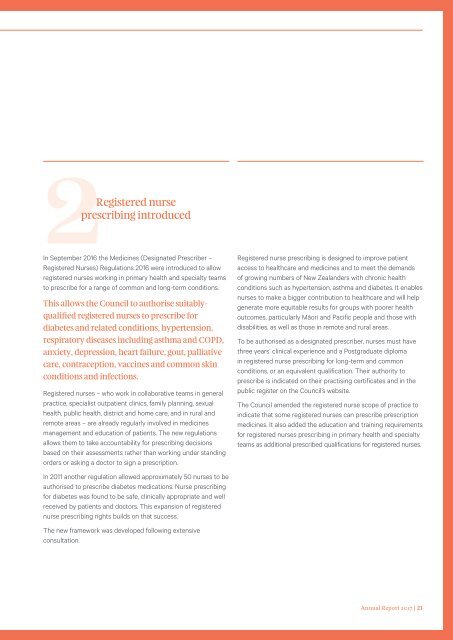NZNA_AnnualReport2017_280817_v10_small
Create successful ePaper yourself
Turn your PDF publications into a flip-book with our unique Google optimized e-Paper software.
2Registered nurse<br />
prescribing introduced<br />
In September 2016 the Medicines (Designated Prescriber –<br />
Registered Nurses) Regulations 2016 were introduced to allow<br />
registered nurses working in primary health and specialty teams<br />
to prescribe for a range of common and long-term conditions.<br />
This allows the Council to authorise suitablyqualified<br />
registered nurses to prescribe for<br />
diabetes and related conditions, hypertension,<br />
respiratory diseases including asthma and COPD,<br />
anxiety, depression, heart failure, gout, palliative<br />
care, contraception, vaccines and common skin<br />
conditions and infections.<br />
Registered nurses – who work in collaborative teams in general<br />
practice, specialist outpatient clinics, family planning, sexual<br />
health, public health, district and home care, and in rural and<br />
remote areas – are already regularly involved in medicines<br />
management and education of patients. The new regulations<br />
allows them to take accountability for prescribing decisions<br />
based on their assessments rather than working under standing<br />
orders or asking a doctor to sign a prescription.<br />
In 2011 another regulation allowed approximately 50 nurses to be<br />
authorised to prescribe diabetes medications. Nurse prescribing<br />
for diabetes was found to be safe, clinically appropriate and well<br />
received by patients and doctors. This expansion of registered<br />
nurse prescribing rights builds on that success.<br />
The new framework was developed following extensive<br />
consultation.<br />
Registered nurse prescribing is designed to improve patient<br />
access to healthcare and medicines and to meet the demands<br />
of growing numbers of New Zealanders with chronic health<br />
conditions such as hypertension, asthma and diabetes. It enables<br />
nurses to make a bigger contribution to healthcare and will help<br />
generate more equitable results for groups with poorer health<br />
outcomes, particularly Māori and Pacific people and those with<br />
disabilities, as well as those in remote and rural areas.<br />
To be authorised as a designated prescriber, nurses must have<br />
three years’ clinical experience and a Postgraduate diploma<br />
in registered nurse prescribing for long-term and common<br />
conditions, or an equivalent qualification. Their authority to<br />
prescribe is indicated on their practising certificates and in the<br />
public register on the Council’s website.<br />
The Council amended the registered nurse scope of practice to<br />
indicate that some registered nurses can prescribe prescription<br />
medicines. It also added the education and training requirements<br />
for registered nurses prescribing in primary health and specialty<br />
teams as additional prescribed qualifications for registered nurses.<br />
Annual Report 2017 | 21


